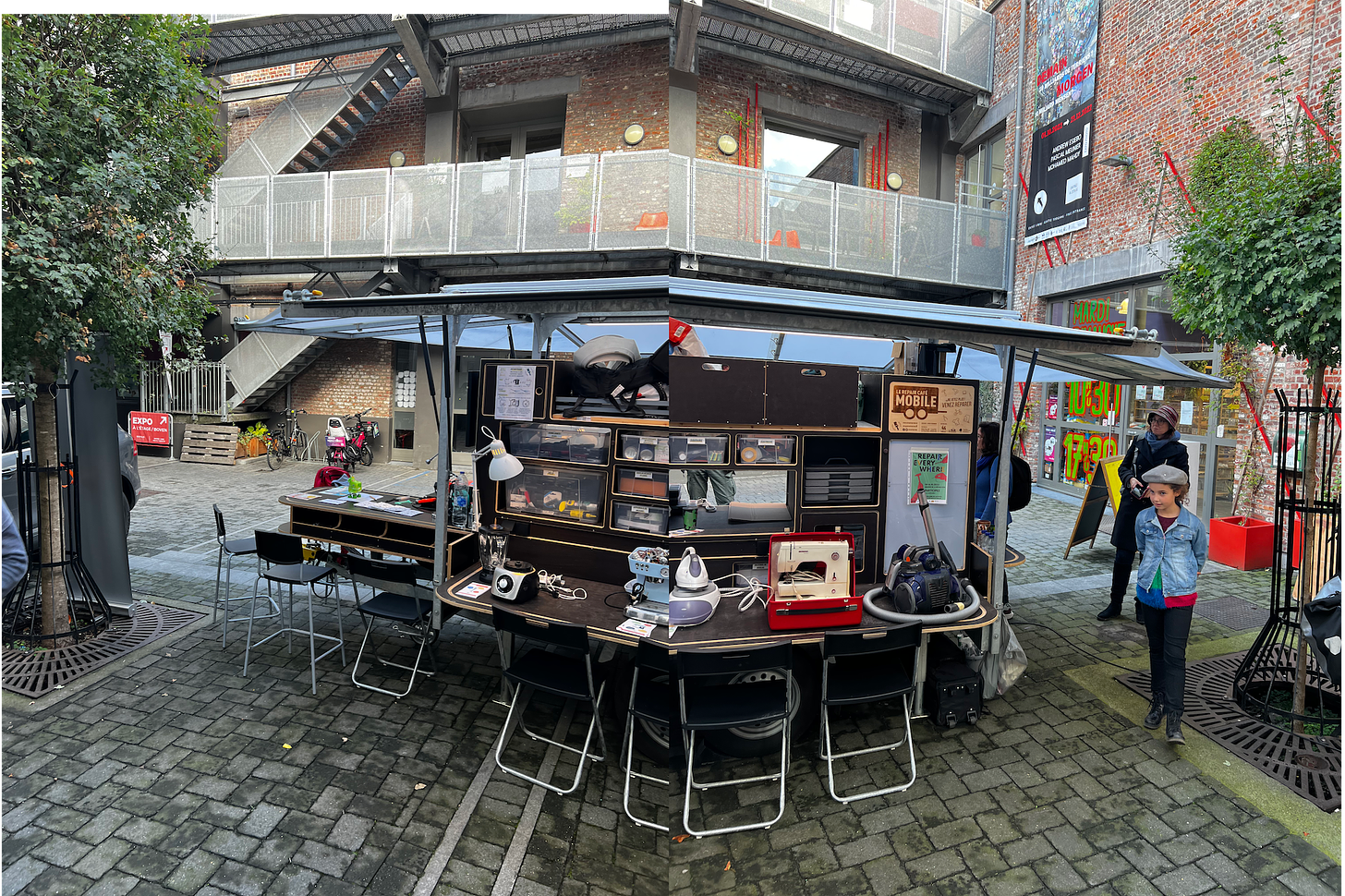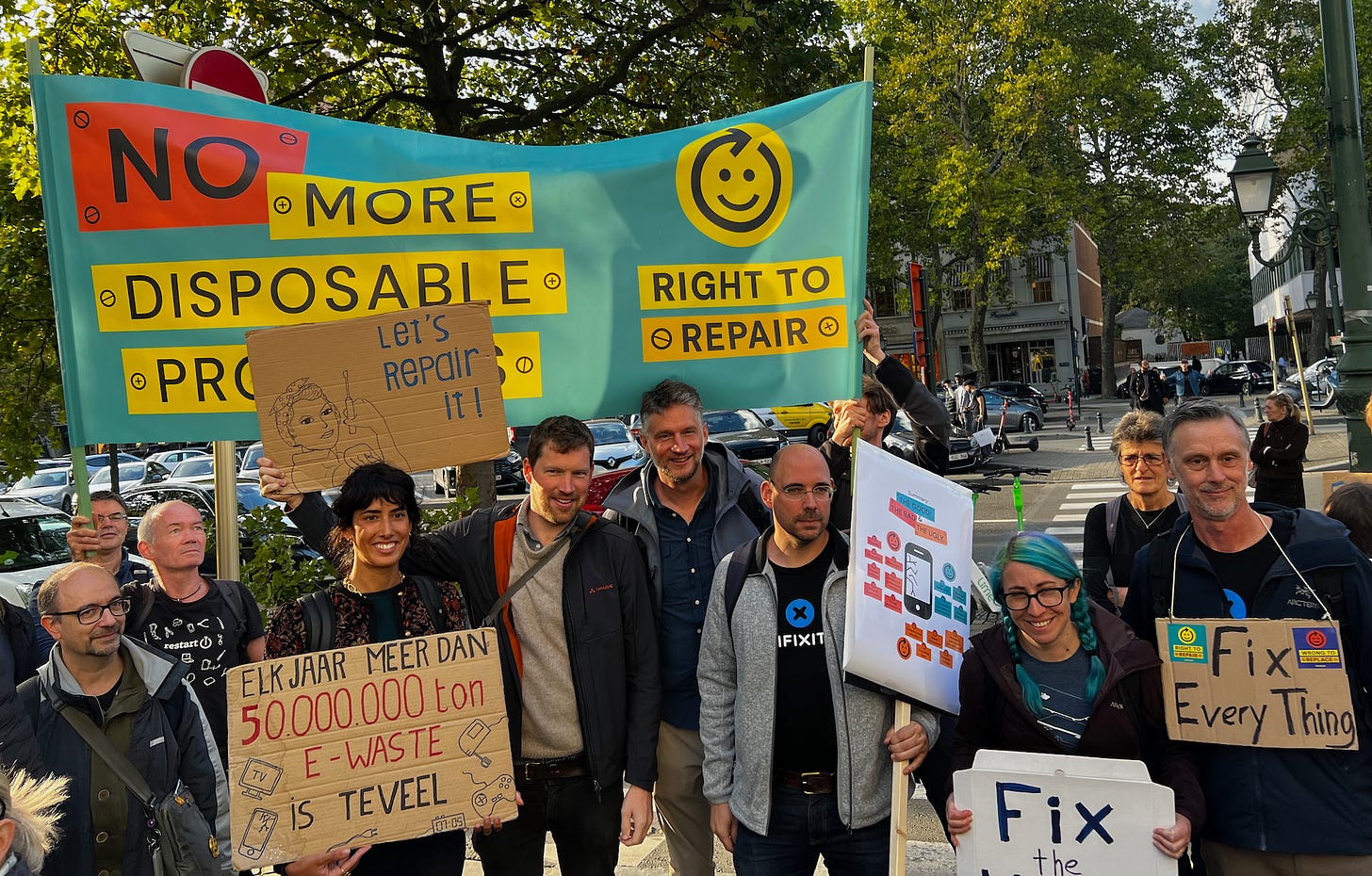At FixFest: Growing a Movement Post-Pandemic
Teaching repair in schools and building broad networks of repair clinics were among the ideas at FixFest in Brussels, an annual gathering of repair advocates from across the globe.
Brussels, Belgium - Attendees at FixFest, an annual gathering of repair advocates, discussed ways to rebuild momentum in the wake of the COVID pandemic, which disrupted a growing grassroots movement of repair clinics and other community events, but failed to dampen growing public enthusiasm for rediscovering repair.
Scores of representatives from nonprofits promoting the repair in the EU and North America said that new measures were needed in the next phase of the grassroots movement to further goals of promoting repairability and reuse. That includes teaching repair skills in schools and developing networks of Repair Cafes that can share resources and expand to serve more communities.
FixFest is in its fifth year, after going online only in 2020 and taking a hiatus on 2021. This year’s event was sponsored by The Restart Project, as well as the EU Right to Repair Campaign and Belgian repair groups Repair Together and Repair and Share. Private sponsorship came from iFixit the US-based repair website and BackMarket, a Paris-based online marketplace for refurbished devices.
The decision to locate to Brussels this year is part of that effort. After starting in London in 2017 and 2018 the annual event visited Berlin, Germany and Italy in 2019 before going online in 2020 and 2021 amid the COVID pandemic.
Setting up the first in-person FixFest since 2019 in Brussels puts issues of repairability and sustainability under the nose of European Parliament and European Commission, both of which have their headquarters in the city.
Blocked repairs by the thousands
“We have to demonstrate that what (policymakers) are doing is not enough,” said Ugo Vallauri, the co-founder and policy director of the Restart Project, one of the organizers of FixFest. After running community repair events for more than a decade, Vallauri said that the need for a legal right to repair is more evident than ever.
Data collected by the Restart Project from repair events it and partner organizations have posted documents 62,000 cases in which individuals attempting to repair something at a clinic encountered barriers to repair, from software locks that prevented diagnosis of problems to the unavailability of information or replacement parts needed to complete repairs.
While the EU and UK have taken measures to implement a limited right to repair for certain categories of products - such as home appliances. But Vallauri said that those laws are limited in scope. “For most products, there is no repair regulation in sight,” he said. “Nor is there anything in the making that we have seen.”
EC: looking at pro-repair solutions
Still, FixFest 2022’s proximity to power paid off. An event hosted Friday by the steering committee of the European Right to Repair Campaign saw the participation of Sara Matthieu, a Member of the European Parliament for the Greens Party as well as Simona Staikova -Van Bommel, a Policy Officer for the European Commission’s Directorate General for Justice and Consumers. It was the first time EU officials have taken part in the event, Vallauri said.
Speaking to an audience of repair advocates, Staikova -Van Bommel said the objective of the European Commission was to achieve “sustainable consumption of consumer goods by promoting repair and reuse.” That might include rules requiring that products are designed in a way that makes them easy to repair, as well as efforts to provide consumers with accurate information on repairability like France’s Repairability Index.
Still, Staikova -Van Bommel had few specifics to offer about what form those new pro-repair rules might take. “We’re still analyzing the problems and different types of solutions to solve them,” she said.
Kicking the COVID hangover
Attendees at the event didn’t seem inclined to wait around for help from lawmakers. Much of the conversation at the weekend-long event was about ways to promote repair absent regulation, especially in the wake of COVID, which caused the closure of many community repair events.
In a group discussion of ways to promote repair locally, organizers of Repair Cafes in the UK, Netherlands and Italy said that they had returned to holding in-person events, but still saw the affects of the COVID pandemic lingering: from lower public attendance to difficulty attracting “fixers” (repair experts) to attend in-person events. Still, all agreed that public interest in the repair events was strong and growing - as the economic downturn and inflation made more people interested in prolonging the life of their belongings.
Coming to a school near you: freshman repair?
In Belgium, RepairTogether is an organization representing 176 community Repair Cafes - local outposts of a movement that started in Netherlands before spreading throughout Europe.
“It’s a big community,” said Luc Deriez, the founder and coordinator of the group, which helped sponsor FixFest. He said that the challenge for his group and others are attracting a broader audience to the repair community. “The difficulty is to have new and young volunteers,” he said. Repair events currently are split mostly between attendees younger than 30 - where sustainability and circular economy notions enjoy strong support - and those older than 50 who are old enough to remember a time when repairing things was common.
Those in their 30s and 40s are less engaged in the movement. “These people are at home and work and don’t have as much time to participate in associations,” Deriez said.
To help spread the word, Repair Together helped fund a Repair Cafe Mobile, a trailer mounted repair shop that has been traveling around Belgium educating the public about repair.

Deriez said more efforts like that are in the works, including “pedagogic tools” that could be used in schools, universities and in the community to teach basic repair skills. Repair Together already makes some materials available as open source projects, but wants to expand on that to foster a change in thinking among young people and a public that has been educated to replace, rather than repair. “We need to put repair back in their mind. It’s not recycling. Repair is first and the most important,” he said.
That was a common theme at FixFest, where a number of presentations and discussions centered on ways to introduce repair as a subject in both elementary and secondary school settings. Beat Schneiderhan and Carl Mau, high school students from Munich, Germany, told attendees about Fixing For Future, a school run repair program that teaches students how to fix broken devices. “Everyone can bring their broken devices and we repair it,” Schneiderhan told Fight to Repair. “We learn how to fix it mostly by ourselves,” he said, though teachers sometimes provide guidance.
Repair classes are two to four times a week and start in middle school and extending through high school. The clinic serves the broader Munich community, but has received items to fix from all over Germany, the two said. “There are a lot of technical skills you learn. But I think the most important thing is the confidence you develop in yourself repairing devices and also the sense of responsibility you have for your clients and their devices,” said Schneiderhan. “You can use this your whole life.”




